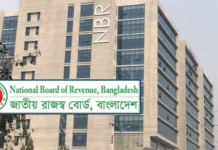

The economy is recovering from damages inflicted by the pandemic but the revival remains fragile owing to rising inflation, exchange rate volatility and squeeze in the government’s fiscal space, said the Centre for Policy Dialogue (CPD) yesterday.
“Many of key macroeconomic correlates are in the recovery trajectory, led by the export-oriented sectors. Regrettably, macroeconomic stability is no longer in a comfortable state,” said CPD Executive Director Fahmida Khatun.
The independent think-tank made the observation at its office while unveiling its analysis on the state of the Bangladesh economy in fiscal year 2021-22.
Rising prices of essentials are hurting the recovery efforts of low-income people.
This was a result of global commodity price rises, the taka’s fall against major currencies, government hike of diesel and kerosene prices, diversion of subsidised credit to non-productive sectors and, above all, lack of good governance.
Meanwhile, overall external balance has been on the negative resulting from surging imports.
Export earnings have been buoyant but it could not take balance of payments on the favourable side as remittance inflows have slumped in the current fiscal year from that a year ago.
“Exchange rate movement could soon emerge as a source of stress,” said the CPD.
Internally, despite growth, revenue collection still remained below the targeted level of the National Board of Revenue (NBR) and reduced sales of national savings certificates shrank government’s fiscal space.
“From what I see, fiscal space is shrinking,” said CPD Distinguished Fellow Prof Mustafizur Rahman at the news briefing.
The CPD said the 23 per cent hike in prices of diesel and kerosene reflects the reduction in the government’s fiscal space.
Citing price increases of chemical fertilisers internationally, he said Tk 9,000 crore was allocated to provide the key crop production ingredient to farmers at subsidised rates.
“But if we want to keep the current price, it will cost additional Tk 22,000-Tk 23,000 crore,” he said, adding that it would be tough for the government to bear the cost without adjusting prices of fertilisers.
Another question will arise in the case of gas price adjustments, he added.
Mustafiz also mentioned that the growth of tax collection by 16.6 per cent was far below the growth the National Board of Revenue (NBR) needs to achieve to accomplish the Tk 330,000 crore collection goal for fiscal year 2021-22.
In such a situation, it will increasingly become difficult to create fiscal space. Policymakers need to understand this medium term challenge, he said.
“In parallel with that we need to increase institutional space. This is the big challenge of 2022. Otherwise economic management will be at a great risk,” he said.
“In this case, we can only handle it if we can increase the institutional efficiency in the areas where entrepreneurs have to spend more in business, such as in port and logistics,” he said.
CPD Research Director Khondaker Golam Moazzem said some groups and businesses strengthened their positions in various sectors and the government seems to have lost control over them.
These seem to be the challenges in the field of institutional space reform, he said.
The CPD said private sector credit flow had grown but it was below the target, reflecting that private investment was not increasing.
“It is a matter of concern,” said Fahmida.
The organisation warned that recovery of loans, including those disbursed under the stimulus packages, would be a critical challenge facing the country’s financial sector, and consequently for macroeconomic management.
The CPD said banks were expected to play a key role in the recovery of the pandemic-affected economy since 86.7 per cent of the government’s Covid-19 response funding was in the form of liquidity support.
“The form and architecture of Bangladesh’s Covid-19 relief funds gave plenty of space for financial malfeasance,” it said.
“Since big companies have received the majority of Covid-19-related liquidity support, it is apprehended that crony capitalists may utilise their significant political clout to exploit banks to collect more than their fair share of funding,” the CPD said.
The think tank recommended that the government take a focused and targeted expansionary fiscal policy supported by an accommodative monetary policy.
It wanted the government to go for direct cash transfers to more vulnerable households alongside the relatively small and informal enterprises to increase domestic demand and provide some protection to the marginalised groups.
“This becomes even more important given the upward creeping inflation scenario,” the CPD said.
The CPD suggested that the government reduce diesel prices in order to cut Boro rice cultivation and transportation costs.
Use of petroleum is widespread in agricultural production, transportation and milling of rice and higher fuel prices will increase production and marketing costs of rice, it said.
Hence, cost driven rise in harvest price of upcoming Boro rice will further create inflationary pressure in the coming months.
“This becomes even more important given the upward creeping inflation scenario,” he said.
Inflation was 5.4 per cent in October, the highest in 12 months.
The CPD said the consumer price spikes do not truly reflect the current level of inflation as the basket of commodities and services used by the Bangladesh Bureau of Statistics was 15-year old and needed revision.
The independent think-tank also suggested re-estimation of national annual demand for rice as the existing base of rice demand could not provide proper market signals, which was needed for government’s procurement, imports and distribution and to contain prices of the staple food.
Policy decisions may be faulty without updated and accurate information, said CPD Senior Research Fellow Towfiqul Islam Khan.









